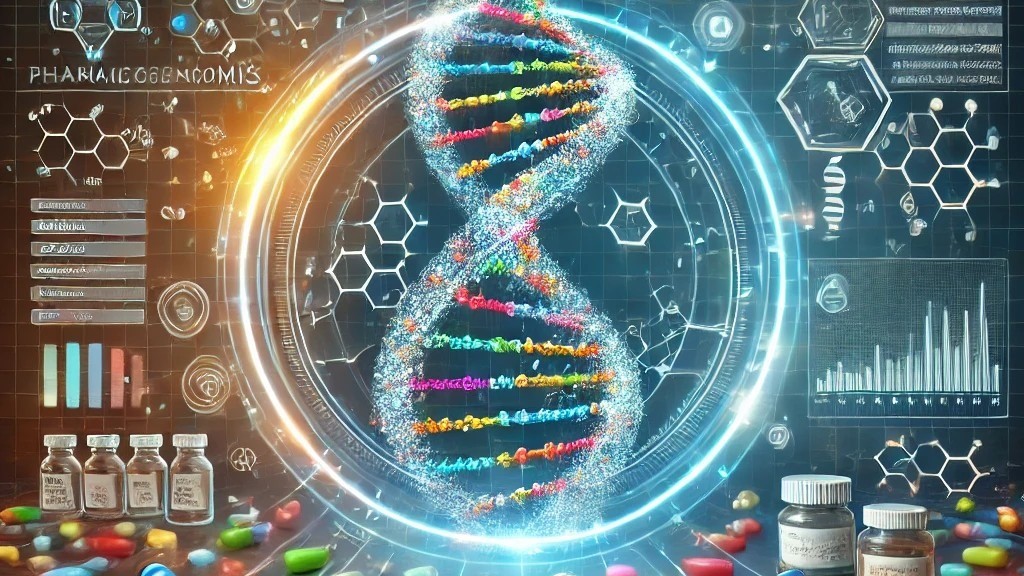Introduction
Pharmacogenomics is a rapidly growing field that focuses on how genes influence an individual’s response to drugs. As medicine shifts towards a more personalized approach, pharmacogenomics aims to tailor treatments based on a person’s genetic makeup, ensuring optimal drug efficacy and minimal side effects. In this article, we will explore how pharmacogenomics is revolutionizing medicine, particularly in the treatment of diseases such as cancer, cardiovascular disorders, and mental health conditions.
What is Pharmacogenomics?
Pharmacogenomics combines pharmacology (the science of drugs) and genomics (the study of genes and their functions) to create customized treatments for patients. It involves analyzing an individual’s genetic profile to determine how they metabolize or respond to specific medications. This approach helps in predicting whether a drug will be effective or cause adverse reactions, allowing for more precise treatment plans.
The Role of Pharmacogenomics in Drug Therapy
Pharmacogenomics is changing the way doctors prescribe medications. Traditionally, most drugs are developed for the general population, but individual responses to these drugs can vary widely. With pharmacogenomic testing, healthcare providers can adjust dosages or recommend alternative medications based on a person’s genetic predisposition.
- Cancer Treatment: In oncology, pharmacogenomics plays a critical role. For instance, certain genetic mutations can predict whether a cancer patient will respond well to specific targeted therapies, such as HER2 inhibitors in breast cancer.
- Cardiovascular Diseases: Pharmacogenomics helps in tailoring treatments for heart conditions. For example, some patients carry genetic variations that affect how they process anticoagulants like warfarin, necessitating personalized dosage adjustments to prevent complications.
- Mental Health: Mental health treatments, particularly for conditions like depression and schizophrenia, can be more effective when pharmacogenomic insights are applied. Genes can influence how a patient metabolizes antidepressants, allowing doctors to select the most suitable drug from the start.
Benefits of Pharmacogenomics
- Reduced Adverse Drug Reactions: Since pharmacogenomic testing can predict a patient’s response to a drug, it reduces the risk of harmful side effects.
- Improved Drug Efficacy: Tailoring treatments to an individual’s genetic makeup ensures that medications are more effective.
- Cost Efficiency: Although pharmacogenomic testing might seem costly at first, it can prevent trial-and-error prescribing, reducing overall healthcare costs by avoiding ineffective treatments and hospitalizations due to adverse reactions.
Challenges and Limitations
- Cost and Accessibility: Pharmacogenomic testing is still not widely accessible due to its high costs, and it is not always covered by insurance.
- Ethical and Privacy Concerns: There are concerns about the storage and use of genetic information. Ensuring patient privacy and preventing genetic discrimination are critical challenges in the widespread adoption of pharmacogenomics.
- Complexity of Drug-Gene Interactions: Many diseases are influenced by multiple genes and environmental factors, making it challenging to develop fully accurate predictive models.
Case Study: Pharmacogenomics in Action
One of the most prominent success stories of pharmacogenomics is the use of the drug Imatinib (Gleevec) for chronic myeloid leukemia (CML). Genetic testing showed that patients with a specific chromosomal abnormality, the Philadelphia chromosome, respond exceptionally well to Gleevec, leading to improved survival rates and reduced side effects.
Future Directions
As genetic testing becomes more affordable and widespread, pharmacogenomics will likely become a routine part of medical care. Ongoing research is exploring the potential of pharmacogenomics in areas like pain management, infectious diseases, and diabetes treatment. As the field advances, it is expected that healthcare will move toward even more personalized, gene-based therapies, improving outcomes for patients across the board.
Conclusion
Pharmacogenomics represents the future of personalized medicine, allowing for the customization of drug treatments based on an individual’s genetic makeup. Although there are challenges, including cost and privacy concerns, the potential benefits of more effective, safer, and cost-efficient treatments are immense. As the field continues to evolve, pharmacogenomics will likely become a cornerstone of modern healthcare, providing tailored solutions for complex health conditions.
References:
- Evans, W. E., & McLeod, H. L. (2003). Pharmacogenomics — Drug Disposition, Drug Targets, and Side Effects. New England Journal of Medicine.
- Relling, M. V., & Klein, T. E. (2011). Pharmacogenomics: A Primer for Clinicians. Nature.
